
Kamal Fouad Jumblatt was a Lebanese politician who founded the Progressive Socialist Party. He led the National Movement during the civil war against the Lebanese Front. He was a major ally of the Palestine Liberation Organization until his assassination in 1977. He has authored more than 40 books centered on various political, philosophical, literary, religious, medical, social, and economic topics. In September 1972, Kamal Jumblatt received the International Lenin Peace Prize. He is the father of the Lebanese Druze leader Walid Jumblatt and the son in law of the Arab writer and politician Shakib Arslan.

The 1958 Lebanon crisis was a political crisis in Lebanon caused by political and religious tensions in the country that included a United States military intervention. The intervention lasted for around three months until President Camille Chamoun, who had requested the assistance, completed his term as president of Lebanon. American and Lebanese government forces successfully occupied the Port of Beirut and Beirut International Airport. With the crisis over, the United States withdrew.
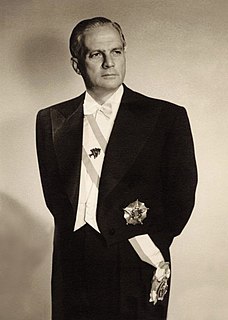
Camille Nimr Chamoun was a Lebanese politician who served as President of Lebanon from 1952 to 1958. He was one of the country's main Christian leaders during most of the Lebanese Civil War (1975–1990).
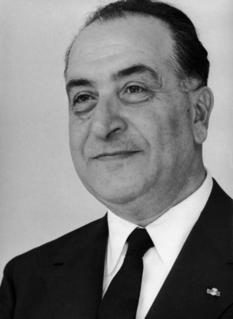
Fouad Abdullah Chehab was a Lebanese general and statesman who served as President of Lebanon from 1958 to 1964. He is considered to be the founder of the Lebanese Army after Lebanon gained independence from France, and became its first commander in 1946.

René Moawad was a Lebanese politician who was elected as the 9th President of the Lebanese Republic for 18 days in 1989, from the 5th to 22 November; before his assassination by unknown assailants.
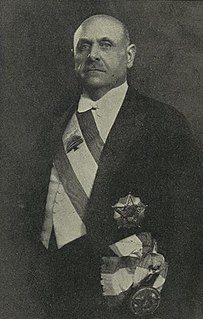
Bechara Khalil El Khoury was a Lebanese politician who served as the 1st president of Lebanon, holding office from 21 September 1943 to 18 September 1952, apart from an 11-day interruption in 1943. He had previously served two short terms as Prime Minister, from 5 May 1927 to 10 August 1928, and 9 May to 11 October 1929.
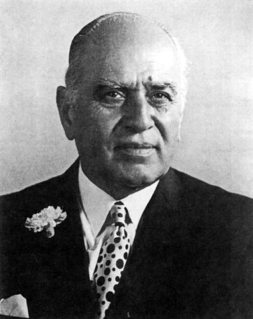
Saeb Salam was a Lebanese politician, who served as Prime Minister six times between 1952 and 1973. Following his death, the Lebanese daily As-Safir described Salam as "most successful in dealing with the media and in presenting a particular image of himself to people on a daily basis through wearing his customary carnation ... and expounding unforgettable slogans", and that he was Lebanon's most popular prime minister after independence leader Riad Al Solh. A significant aspect of Salam was that, unlike other Lebanese leaders, he did not act as a chief over a particular area in the country. Salam fiercely advocated the unity of Lebanon.

Adel Osseiran - also transliterated Adil and/or 'Usayran or Osseyran - was a prominent Lebanese statesman, a former Speaker of the Lebanese Parliament, and one of the founding fathers of the Lebanese Republic.

Petro Trad was a Lebanese lawyer, politician, who served as President of the French Mandate of Lebanon for a brief period.
The Maronite League – ML or Ligue Maronite in French is a private, non-profit and apolitical organization of Lebanese Christian Maronite notables, dedicated mainly to defend the independence and sovereignty of Lebanon in the cadre of a democratic and pluralistic society. The President of the Maronite League is the highest civic Maronite authority in Lebanon after the President of the republic and is empowered to speak for the Maronite community of Lebanon. The Maronite League is also the political wing of Bkerké, the ecclesiastical patriarchal authority in Lebanon. The current President of the Maronite League is the former President of the Lebanese Bar Association, Lawyer Antoine Klimos, elected in March 2016 in Beirut.
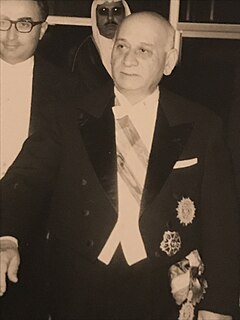
Nazem Akkari was a Lebanese politician who became the 19th Prime Minister of Lebanon for a short period 9 to 14 September 1952 and then temporary Deputy Prime Minister until 30 September 1952 in the most turbulent time of transfer of power from President Bechara El Khoury to President Camille Chamoun in September 1952.
The Lebanese space program was not initially an official government-sponsored effort. Rather, it revolved around the Lebanese Rocket Society which emerged from the Haigazian College Rocket Society, and was founded by Manoug Manougian in 1960. The original society gained fame in Lebanon after a series of successful launches of Cedar rockets and in 1962 President Fouad Chehab announced limited governmental funding for the renamed Lebanese Rocket Society which was also contacted by the Lebanese military to develop weapons.
Roland Aboujaoudé was a Lebanese Catholic Maronite eparch of the Maronite Catholic Patriarchate of Antioch.
Constitutional Bloc was a Lebanese political party established in 1934 by Bechara El Khoury and advocating the full independence of Lebanon ruled at the time by the French Mandate and fought for its achievement in 1943. The Bloc also advocated an active role in establishing the Arab League with Lebanon as an integral part of the Arab World. It was also active in approving the Lebanese National Pact as an agreement between the various Lebanese religious communities, an unwritten agreement that laid the foundation of Lebanon as a multi-confessional state.

Sheikh Boutros el-Khoury was a Lebanese businessman, banker and industrialist. A successful self-made man, Khoury managed to build a large commercial and industrial empire, and was one of Lebanon's most well-established businessmen from the 1950s to the 1970s. Khoury was an important figure of the Lebanese ruling elite in the second half of the 20th century. He played a decisive role in the development of economic legislation, and used his expertise in the resolution of several major national crises.

Philippe Najib Boulos was a lawyer and an active figure of Lebanon's politics in the 20th century. Born in 1902 in Beirut, he worked as a lawyer and became a member of Lebanon's politics from 1941 until his death. During that period, he was elected minister three times and deputy three times, contributing to different sectors of Lebanon's politics such as education, justice and public work.
The First Lady of Lebanon is the title attributed to the wife of the President of Lebanon. The country's present first lady is Nadia El-Chami, wife of President Michel Aoun, who has held the position since October 31, 2016.
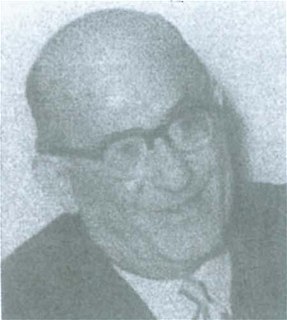
The second Lebanese government after independence and the second under President Bechara El Khoury, who was commissioned to form it by Decree No. 1484 of July 3, 1944, and the government was formed by Decree No. 1485 on the same date of the assignment. The Cabinet resigned on January 9, 1945.















